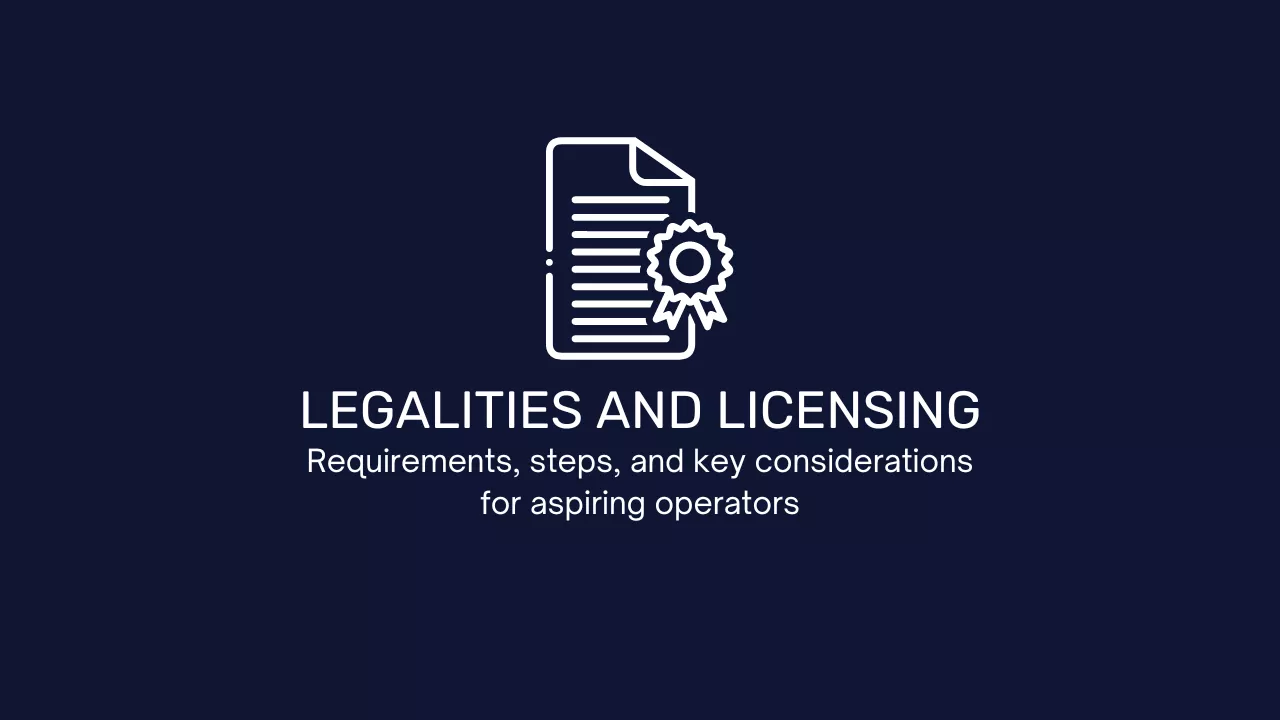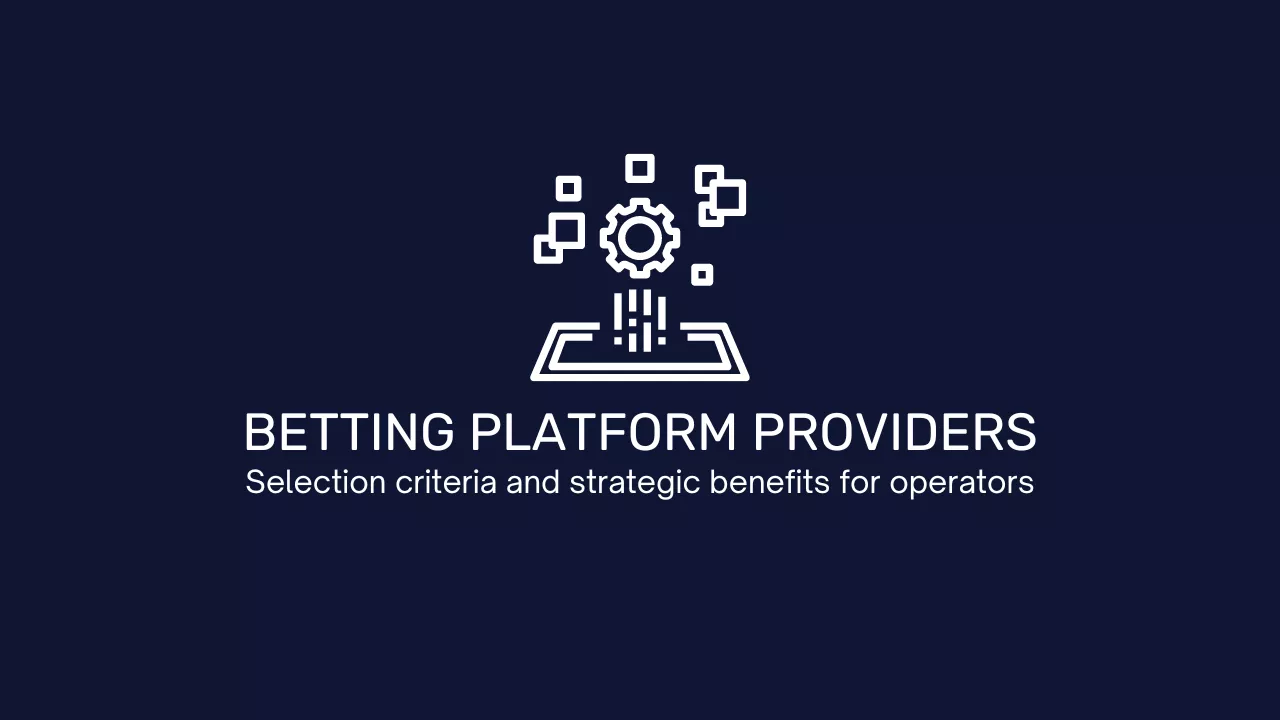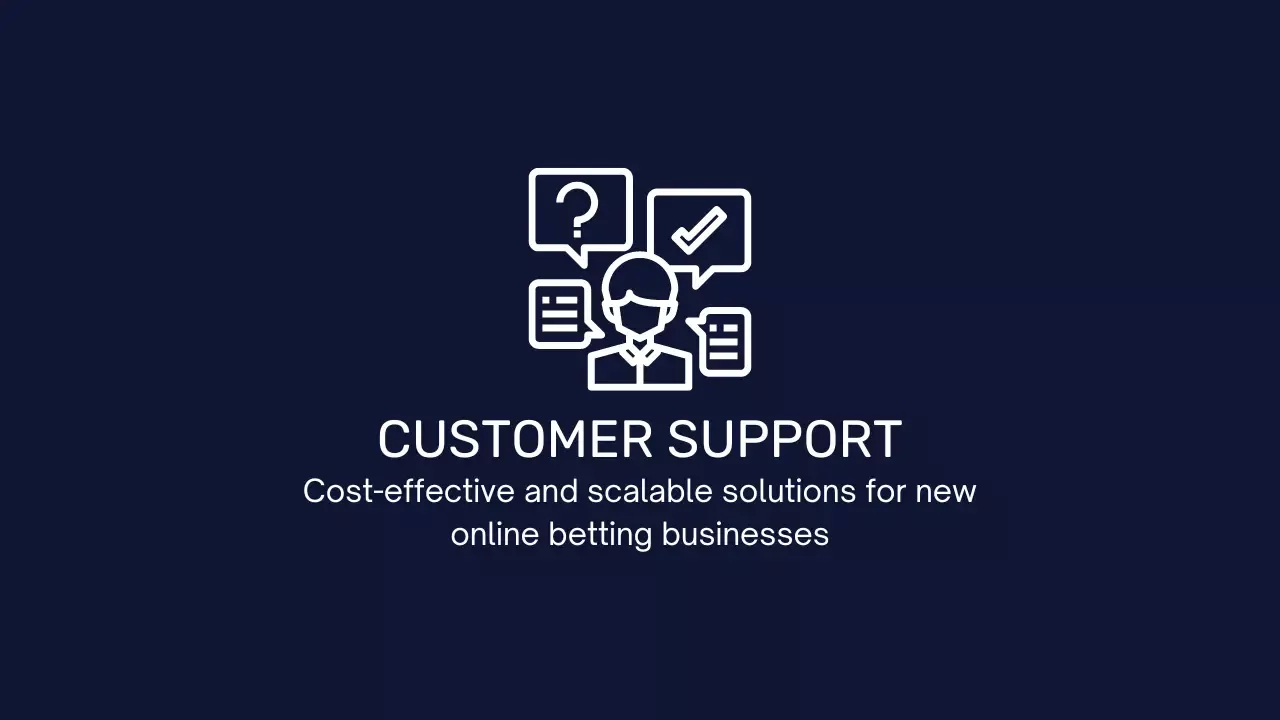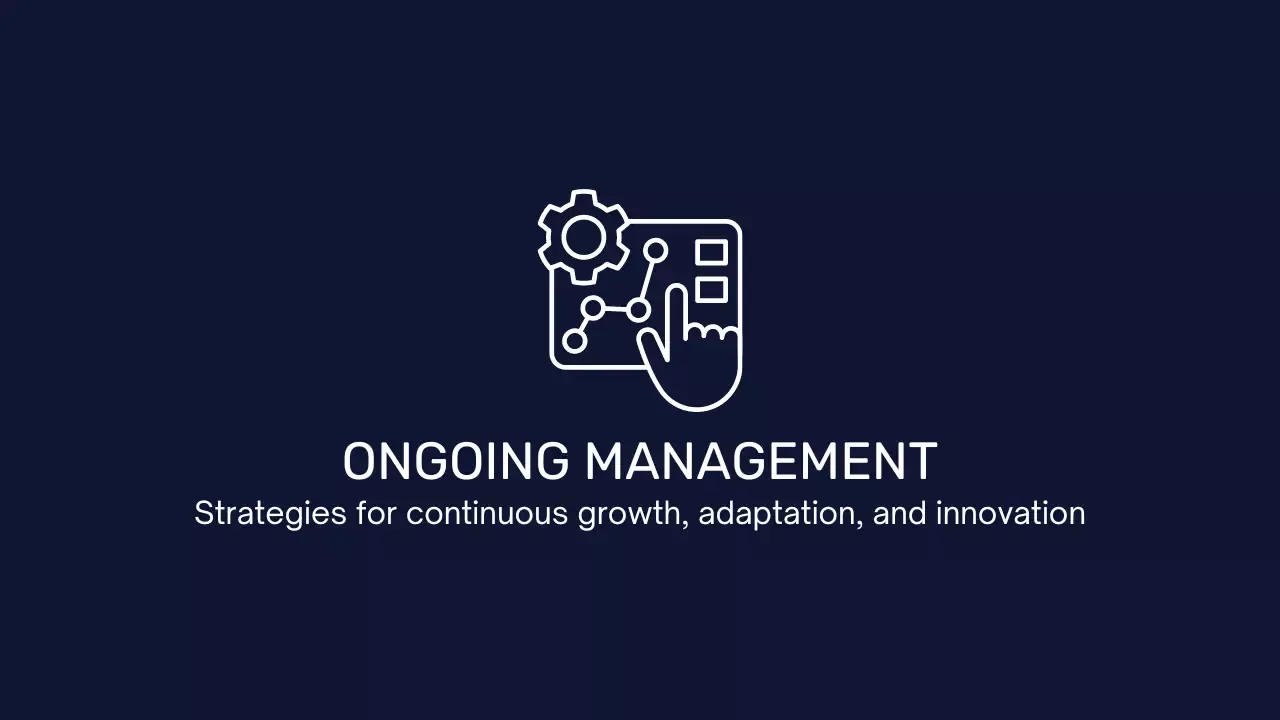Interviews & Editorials
Starting an Online Betting Business: A Beginner's Guide

Over the last decade, the world of online betting has expanded at an exponential rate. The industry has evolved significantly from its early days of simple websites to today's sophisticated platforms offering a plethora of iGaming and betting options. As the digital age advances, many people are drawn to the prospect of starting their own online betting business. This guide is designed for beginners who are thinking about embarking on this journey. We'll go over the fundamentals you'll need to know, from legalities and licensing to understanding your market and budgeting. Let's dive right in!
Legalities and Licensing #

Understanding Licensing Requirements #
Different jurisdictions come with their own sets of regulations and licensing protocols. Generally, to acquire a license for an online betting business, you will be asked to meet a few standards, including demonstrating your financial stability, the fairness of your software, and policies that promote responsible gambling.
Proving your financial stability: For beginners, this might sound counterintuitive. How can one prove stability when just starting? But this requirement is in place to protect players and ensure the business won't collapse or withhold payments. Here's how you can demonstrate this stability:
Bank statements: Provide recent bank statements to show you possess adequate capital. Some jurisdictions have a minimum capital requirement for betting businesses.
Financial guarantees: Some regulatory bodies might require a bank guarantee, essentially a promise that funds can be claimed if there's any breach of obligations.
Business plan & financial projections: Showcasing a well-structured business plan with revenue models, expected expenses, and profit projections can convince regulatory bodies of your venture's longevity and profitability.
Documented investments: If you've managed to secure any investments or commitments from potential investors, present these as evidence.
Ensuring fair and transparent software: This is about trustworthiness. Your betting platform, especially its software, should operate fairly. This typically involves having a Random Number Generator (RNG) for games, which is tested and certified by recognized third-party agencies.
Promoting responsible gambling: Regulators look favorably upon businesses that promote responsible gambling. This means having measures to prevent underage betting, providing tools for players to set limits on their gambling activities, and offering resources or links to help with gambling disorder.
It's essential to be thoroughly prepared when applying for a license. The process can be lengthy and detailed, but it's a foundational step in establishing a reputable online betting business.
Getting a License #
The process of obtaining an online betting license can be daunting, but it's a necessary step to ensure your business operates legally and gains the trust of potential customers.
Understanding types of licenses
Operating license: This license permits the holder to organize bets. It covers everything from casino games to sports betting, lotteries, and more.
Personal management license: Certain key personnel in your company, like directors or head of departments, might need this license, especially if they're responsible for strategy, financial planning, marketing, or any role influencing the outcomes of gambling.
Personal functional license: This is required for people in specific roles like the gaming managers or pit bosses.
Remote gambling and software technical standards: If you're operating online, this isn't exactly a license, but a standard that your platform needs to adhere to, ensuring that your software is transparent and fair.
Steps to Acquire a License
1. Choose a jurisdiction: Different countries or regions have their own regulations and licensing bodies. Common jurisdictions include Malta, Curacao, Gibraltar, and the UK. Your choice will depend on your target market, budget, and how each jurisdiction's regulations align with your business goals.
2. Prepare required documentation: This includes proof of financial stability (as previously detailed), criminal background checks, software fairness certificates, and business plans.
3. Submit application: Once you've gathered all necessary documents, you'll need to fill out an application form for the chosen jurisdiction. This might also come with an application fee.
4. Await evaluation: The regulatory body will evaluate your application. This can take anywhere from a few weeks to several months, depending on the jurisdiction.
5. Pay licensing fee: Once approved, you'll need to pay the licensing fee. The cost can vary widely based on the jurisdiction.
6. Ongoing reporting and renewals: After obtaining the license, ensure to comply with all ongoing reporting requirements and renew the license as needed, which might be annually or biennially, based on the issuing authority.
It's essential to remember that while the process might be rigorous and time-consuming, obtaining a license gives your betting business legitimacy. It reassures players of the safety and fairness of your platform, setting the foundation for a successful venture.
Budgeting and Capital #

Starting an online betting business requires not only a vision but also a strategic financial plan. The very core of this venture is intertwined with financial transactions, making it vital to ensure proper budgeting and sufficient capital. Here's how to navigate the financial landscape:
Initial Costs #
Every new business demands some upfront investment. For an online betting platform, these costs can include:
Licensing: The fee for obtaining a license can vary widely based on the chosen jurisdiction. For example, licenses from jurisdictions like Curacao might be more affordable than more recognized ones like the UK Gambling Commission.
Software acquisition: Whether you're purchasing a pre-made solution or investing in custom-built software, you'll have initial costs. Pre-made solutions often come with a set-up fee and monthly charges, while custom solutions might have a higher upfront cost but can be more cost-effective in the long run.
Website development and hosting: Beyond the betting software, there's the website infrastructure. This encompasses design, domain registration, hosting, and security certificates (like SSL). Consider both initial design and ongoing hosting and maintenance fees.
Branding & marketing materials: Establishing a brand identity is paramount. Logo creation, promotional materials, and initial marketing campaigns will require funds.
Legal & consultant fees: Ensuring you're on the right track legally might require you to seek counsel or consulting, especially in the early stages.
Operational Costs #
Once the business is live, operational costs come into play. These ongoing expenses include:
Platform maintenance: This covers periodic updates, bug fixes, and improvements to ensure a seamless user experience.
Employee salaries: If you have a team – be it technical support, customer service, or marketing – you'll need to budget for salaries.
Marketing, advertising & SEO: Consistent brand visibility requires ongoing marketing campaigns, be it online ads, social media promotions, or partnerships. Beyond traditional marketing, investing in SEO is vital for online visibility.
License renewals & regulatory compliance: Some licenses come with annual or biennial renewal fees. Staying compliant might also involve periodic audits or certifications, which can have associated costs.
Revenue Projections & Contingency Planning #
Setting expectations: Forecast potential revenues by researching the market and understanding potential user acquisition rates. It's vital to be realistic and factor in competition and market saturation.
Contingency fund: As with any business model, unexpected expenses can arise. It's prudent to set aside a percentage of your budget for unforeseen costs, ensuring your business can navigate any financial hiccups.
Budgeting effectively requires a combination of research, forecasting, and a bit of caution. By understanding both initial and operational costs, and by preparing for the unforeseen, you lay a solid financial foundation for your online betting venture.
Choosing Your Betting Platform Provider #

When launching an online betting venture, one of the most crucial decisions you'll make is selecting the right platform provider. This choice not only determines the functionality and appearance of your site but also impacts operational efficiency, scalability, and user experience. Let's delve into the different types of platform solutions and the providers behind them.
Types of Betting Platforms #
In-house Solution
Overview: Developed and maintained by large betting companies like Bet365, this proprietary solution is created exclusively for a specific company's use, ensuring tailored features and a unique user experience.
Best for: Larger betting operators with the resources to invest in dedicated platform development and maintenance.
Off-the-Shelf Platform
Overview: Platforms offered by third-party providers, such as NSoft, are available for purchase by any betting operator. These pre-made solutions can be branded and customized to an operator's requirements.
Best for: Businesses aiming for a rapid market entry, with the benefit of customization, minus the extensive development time of an in-house platform.
White-Label Solution
Overview: A specific offering from third-party providers, these platforms are off-the-shelf but come with the added advantage of pre-obtained licensing. This means faster market entry without the challenges of obtaining licenses independently.
Best for: Startups or companies wanting a speedy market debut without getting deep into licensing but still desire a uniquely branded platform.
Key Considerations for Your Platform #
Essential Features
1. User-friendly interface: Ensure that the design is intuitive, making it easy for users to place bets, manage their accounts, and navigate through different sections.
2. Mobile optimization: With many users betting on mobile devices, a responsive or dedicated mobile version/app is crucial.
3. Payment gateway integrations: Offer multiple payment options, including credit cards, e-wallets, and cryptocurrencies, ensuring global accessibility and convenience.
4. Security features: Implement advanced encryption and robust security protocols to protect user data and financial transactions.
5. Live betting & streaming: Modern bettors often seek platforms offering real-time betting opportunities and live streaming of events.
6. Customer support integration: A built-in chat system or support ticketing ensures users can quickly get assistance.
Scalability & Adaptability
Growth prospects: Ensure that the platform can handle a growing number of users and increased traffic. This is especially important if you aim to expand to new markets or offer additional betting types.
Adapt to trends: The betting industry, like any other, evolves. Your platform should be adaptable to incorporate new betting trends, games, or technological advancements.
Demo and Feedback
Testing: Before committing, request a demo or trial period. Engage with the platform as a user would to gauge its efficiency, speed, and user-friendliness.
User feedback: If considering a white-label solution, seek feedback from users of other brands using the same platform. Their insights can reveal potential pitfalls or strengths not immediately apparent.
Selecting the right betting platform is the linchpin for your business's success. It's more than just a tool; it represents your brand, influences user retention, and plays a significant role in operational efficiency. Take the time to research, demo, and deliberate before making your choice, ensuring that it aligns with your business vision and goals.
Understanding Your Market #

To thrive in the online betting industry, a deep grasp of your market landscape is indispensable. It's more than just offering bets and games—it's about tapping into the preferences, nuances, and trends that define your audience and the industry. Here's how to navigate this terrain:
Identifying your target audience: Understand your users by assessing bettors' demographics in your region, their betting preferences—be it sports, casino slots, crash games, live bets, or e-sports—and their motivations, whether for thrill, profit, or entertainment. This insight will guide your platform's design and offerings.
Regional preferences: Tailor your platform to regional specifics. Europe may favor football (soccer), while the US leans towards American football or basketball. Familiarize yourself with each region's regulations and cultural nuances in betting to ensure compliance and align with local expectations.
Competitor analysis: pinpoint key players in your market, study their strategies, and learn from their triumphs and missteps. This knowledge not only guides your strategy but can help identify a unique selling proposition (USP) for your platform. Focus also on technological innovations they employ, like live chat or AI-driven suggestions, which can be vital for your platform's tech framework.
Market trends: watch for emerging niches like e-sports or virtual sports. Track tech advancements such as blockchain and trends like gamification because early adoption can give you an edge. Always stay updated with changing user behaviors in the digital age to ensure your platform's continued relevance.
Website Design and UX #

The interface of your online betting platform is the gateway to retaining users. A frictionless, intuitive experience not only attracts users but ensures they return.
User retention: A well-designed website minimizes bounce rates. If users can't navigate your platform or face hurdles, they're likely to switch to a competitor.
Trust and credibility: A professional, sleek design is often equated with reliability. Users are more likely to trust a platform that looks and feels polished.
Conversion rates: An optimized design facilitates the user journey from landing on the site to placing a bet, thereby increasing conversion rates.
Cost Considerations #
Templates vs. custom design: Custom designs, tailored uniquely to your brand, tend to be more expensive. However, there are numerous high-quality templates available at a fraction of the cost. These can be customized to fit your brand, providing a balance between uniqueness and budget.
Freelancers vs. agencies: Hiring a design agency might ensure a comprehensive design service, but it's costlier. Freelancers, especially from platforms like Upwork or Fiverr, can provide quality work at more affordable rates. Always review portfolios and testimonials before hiring.
Ongoing maintenance: While the initial design is a significant cost, remember to budget for ongoing website maintenance. Updates, fixes, and tweaks will be necessary, and these come with recurring expenses.
Safety and Security #

In the competitive arena of online betting, the pillars of safety and security are non-negotiable. Your future business reputation, user trust, and regulatory compliance depend heavily on these aspects.
Protecting user data: An online betting platform's value lies in its dedication to user data protection. Trust is built and maintained through a secure platform. Lapses can damage reputation, invite regulatory penalties, and cause financial losses. Essential security features include SSL certificates, which encrypt data, robust firewalls like WAF to counter threats, and Two-Factor Authentication (2FA) to bolster account security.
Ensuring fairness in play: User engagement hinges on their trust in a game's fairness. The Random Number Generator (RNG) guarantees that game outcomes, from slot spins to card deals, are random and unbiased. Regulatory bodies often require RNG certification to affirm game impartiality. A verifiable RNG system not only meets these mandates but bolsters platform credibility, ensuring user retention and sustained revenue.
Marketing Basics #

Navigating the competitive landscape of online betting demands a robust marketing strategy. From enticing promotions to leveraging digital spaces for visibility, here’s a breakdown of the essentials your new online betting business is going to need:
Promotions #
Welcome bonuses: Offering bonuses to new users can make your platform more appealing. It's a way of thanking them for choosing your platform, be it through free bets, deposit matches, or cashback offers.
Loyalty programs: Rewarding long-term users fosters loyalty. Consider tiered loyalty programs, where the more a user bets, the bigger the rewards.
Event-based promotions: Tie bonuses to major sporting or cultural events. For instance, during the World Cup or the Super Bowl, offer themed bonuses or enhanced odds.
Referral programs: Encourage users to bring friends to the platform by offering them rewards for every successful referral.
Caution: Always ensure that your promotional strategies adhere to regulations and encourage responsible gambling.
Online Visibility #
Keyword research: Identify terms potential users might search for. Tools like Google Keyword Planner or SEMrush can help. Ensure your website content, especially landing pages, incorporate these keywords.
Quality content: Create blog posts or articles related to betting tips, news, or strategies. This not only boosts SEO but positions you as a thought leader.
Social media engagement: Regularly update your social media profiles with engaging content, be it behind-the-scenes looks, upcoming promotions, or highlights from major betting events. Platforms like X, Instagram, and Facebook can be instrumental in reaching a broader audience.
Reputation building: Earn backlinks from reputable websites in the betting or sports industry to enhance your website’s credibility and SEO ranking.
User experience (UX): Ensure your website is mobile-responsive, quick to load, and easy to navigate. Search engines value good UX.
Budget Allocation #
1. Set clear objectives: Before allocating funds, define what you aim to achieve, be it user acquisition, brand awareness, or user retention.
2. Diversify spending: Don't put all your money into one channel. Split your budget across online ads, social media campaigns, content creation, and other marketing avenues.
3. Track ROI: Use analytics tools to monitor the return on investment for each marketing effort. If a strategy isn’t yielding results, consider reallocating funds.
4. Adjust & evolve: The digital landscape is dynamic. Regularly review and adjust your marketing budget based on platform updates, market shifts, or new opportunities.
5. Consider seasonality: The betting world is influenced by sports seasons and major events. Be prepared to adjust your budget based on high-demand periods.
Customer Support #

For newcomers in the online betting world, delivering stellar customer support is a game-changer. It's not just about resolving issues—it's your first line of building trust, ensuring users feel valued, and collecting invaluable feedback. Starting doesn't require a vast setup. Let's explore simple, yet effective ways to provide reliable support as you begin your business venture:
Starting Small: Beginner-Friendly Support Options #
Email support: Email support offers a cost-effective way for users to voice concerns, suitable for scaling businesses. By featuring a prominent dedicated email on the platform and utilizing ticketing systems, concerns can be efficiently organized. However, swift responses, preferably within 24 hours, are crucial to satisfy user expectations.
FAQs and knowledge bases: Before you have a full-fledged support team, having an extensive FAQ or knowledge base can address common queries. It's a one-time effort that can reduce the volume of basic questions directed to your email support.
Chatbots: As an interim solution, chatbots can handle basic queries, guide users around the platform, and provide instant responses. They can also gather preliminary information before directing users to email support for more complex issues.
Feedback forms: Encourage users to submit feedback or report issues through on-site forms. This not only aids in problem resolution but also helps in gathering insights about user experiences and potential platform improvements.
Starting small doesn’t mean compromising on quality. With the right tools and a user-first approach, even a budding betting platform can offer top-tier support.
Ongoing Management #

Every business requires constant attention and evolution, even more so in the dynamic world of online betting. As the digital landscape and player preferences shift, here’s how to keep your fingers on the pulse and remain a step ahead:
Monitoring Performance with Beginner-Friendly Tools #
Google Analytics: A free, comprehensive tool to track website traffic, user behavior, bounce rate, and more. It provides valuable insights into where your traffic comes from and which pages or games are most popular.
Google Search Console: Complementing Google Analytics, this tool provides insights into your website's search performance, indexing status, and potential issues affecting rankings.
Hotjar or Crazy Egg: Visual tools that give heatmaps, revealing where users click, move, and scroll. This can be instrumental in improving user experience.
Basic CRM Systems: Tools like HubSpot offer free versions that allow you to manage customer relationships, track interactions, and even handle basic email marketing campaigns.
Staying Ahead: Embracing Change and Innovation #
Stay updated: Regularly research industry trends, emerging technologies, and new market preferences. This ensures you stay current and your offerings remain relevant.
Feedback loop: Encourage user feedback. The players on your platform can offer invaluable insights into improvements or new features they'd like to see.
Pivot when necessary: If a particular betting category isn't performing well, or there’s a new and emerging trend, don't hesitate to adapt. The agility to change, pivot, or refine is a hallmark of successful online ventures.
Conclusion #
Launching and running an online betting business is a journey that requires a blend of meticulous planning, industry insight, and adaptability. From ensuring legal compliance through licensing to selecting the right platform, every step sets the stage for your business's future. And once you're live, it's the ongoing management—monitoring and adapting—that determines your success in the long run.
As you embark on this venture, remember that while the betting industry offers vast opportunities, it's the user experience, transparency, and integrity that will set your platform apart. Keep learning, stay adaptable, and may your business thrive in the dynamic world of online betting.
Navigating the online betting industry can be daunting, but with NSoft by your side, success is within reach. From platform solutions to expert guidance, we've got you covered. Contact NSoft today and make your vision come alive!
Tags:
Related Articles
Interviews & Editorials
06.06.2023.
Understanding the Core Components of Betting and iGaming Industry
Explore the components driving the meteoric rise and unwavering appeal of the betting and iGaming industry. From digital platforms to brick-and-mortar establishments, discover the interconnected elements shaping this dynamic $92.9 billion industry.
Learn more
Interviews & Editorials
29.11.2021.
NSoft: Exploring growth opportunities on Colombia’s iGaming market
The Colombian sports betting industry is expected to experience major growth with mobile betting leading the way. The main advantage of placing online sports bets is that the country does not tax online winnings. NSoft’s Regional Sales Manager, Mr. Carlos Roberto Vargas explains why Colombia is one of the safest betting environments in Latin America.
Learn more
Interviews & Editorials
22.02.2021.
Coexistence of physical and digital - a story of 2020 betting business
With the physical aspect of our lives so abruptly taken from us, each and every person in igaming immediately scratched every retail-oriented project and started working on the digital. Virtual games and esports frenzy set the stage for the following months.
Learn more
Didn’t Find What You’re Looking For?
Our team will be happy to guide you through our products and services.
Contact us
